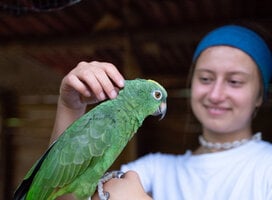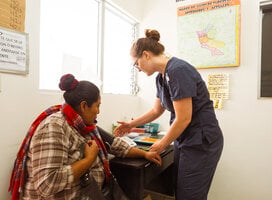Volunteer in the Galapagos Islands
Just 600 miles west of Ecuador pop up the wonderful Galapagos Islands, formed over the last hundreds of thousands of years due to regular volcanic eruptions that continue today. Only 5 of the 50+ islands in the chain are inhabited, and each are being faced with unique challenges. The islands are quickly becoming over populated and the increased tourism is negatively affecting the islands’ natural resources.
Even before Charles Darwin, a Spanish pirate named Diego de Rivadeneira dubbed the Galapagos “Las Islas Encantadas” (the Enchanted Islands). Between the islands’ ample endemic wildlife and rare species, volcanic peaks, and gorgeous landscapes, you may find a short-term volunteer trip here is not enough!
While there are a few different options for the types of programs you can volunteer for in the Galapagos Islands, most people head that way to help in conservation efforts, as the islands’ current ecosystem is in critical need of attention. The Galapagos is one of the natural wonders of the modern world and volunteers’ work will contribute greatly to the survival of these beautiful islands.
Conservation
Due to the recent severe degradation of the Galapagos wildlife, volunteers are needed to participate in conservation work; this type of volunteering can vary from replanting native species to the island to for reproduction purposes or working directly with animals, such as sea turtles and sea lions, to help maintain the population and keeping sea turtles safe, or working with sea lion conservation efforts. Volunteers would be responsible for contributing to the planting of new crops and helping with general maintenance of these biological reserves.
Childcare
While volunteering in the Galapagos, you can opt to help out at a community day care or nursery center. These organizations exist to aid both disadvantaged children and their mothers, especially those who have suffered from domestic violence. Volunteers contribute in keeping the facilities in good care and helping serve meals (some of these nursery centers help over 100 people daily). Volunteers are also needed to have fun with the children and lead activities. Your efforts will make a positive impact on the lives of people for whom poverty is faced everyday.
Teaching English
Many public schools do not have the resources available to teach its students proper English. Most of these classes are multilingual, so if you are a Spanish-speaking volunteer, you will also have ample opportunity to use your language skills in the field! The Galapagos Islands’ educational facilities are very basic, and the availability of quality teachers is low. Volunteers are needed in Galapagos to work alongside local teachers in an effort to help children improve their conversation skills, and provide creative language lessons to students.
Volunteering Tips
Whether you are in the middle of a career break, at the onset of your next big move, or just feeling called to take a step away from your current life in search of more meaning, a volunteer abroad experience is a worthwhile investment of your time and energy. Most individuals walk away from their program feeling having gained new practical skills and lessons that will make them armed for life’s tougher hurdles down the road.
If you have always been enchanted by these islands and desire to know them in a deeper way than from your cruise ship deck, a volunteer abroad program in Galapagos will make a great fit for you. Tap into your inner explorer and head out into the Pacific for an adventure of a lifetime!
Health and Safety of Volunteers in the Galapagos Islands
Routine shots are recommended for all volunteers in the Galapagos Islands. Be sure to visit your doctor between 4-8 weeks before your begin your trip. While there, be mindful of the water you are consuming and avoid using tap water at all times in possible (even when brushing your teeth!) No one wants to be hugging the toilet bowl instead of enjoying the island life, after all.
Crime is not a large problem in the Galapagos, though it is always recommended to be mindful of your belongings to avoid being pickpocketed. The greater danger lies in your proximity to wildlife; be respectful of animals, especially those with their young - swimming too close to the seal colony does not bode well for bulls with their harems. Sharks are generally not a problem around the islands but always take caution.
Contributed by Megan Lee | Header photo by David Berkowitz





















